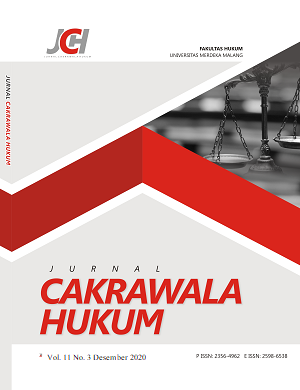Sistem "full pre trial disclosure" dalam penegakan asas peradilan sederhana, cepat, dan biaya ringan
DOI:
https://doi.org/10.26905/idjch.v11i3.5473Keywords:
Legal Principles, Court, Judiciary.Abstract
Legal principles as basic norms are described as the basis / general guidelines forpositive law / applicable law. One of the legal principle problems that will be discussedby researchers in this research is about the application of principles that arenot in accordance with the reality that occurs in court. There are too many formalitiesthat are difficult to understand, and the rules are not clear, which allows for multiple interpretations and results in fear of proceeding in court. Too many formalitiesare an obstacle to the running of the courts. In this case the problem is notonly in the examination at trial, but also in the settlement of the examination reportat the trial until the signing of the decision by the judge and its implementation. Itoften happens that a case is delayed for years because the witnesses do not come, orthe parties in turn do not come or decide to withdraw from the case. In fact, there areseveral cases that were continued by their heirs. Meanwhile, in terms of costs incourt, the high court costs will cause interested parties to think again and againabout filing a claim to court. Based on this, it can be concluded that the speed withwhich the trial runs will increase the court’s authority and increase public confidencein the court.
How to cite item: Shanty, W. Y. (2020). Sistem“full pre trial disclosure†dalam penegakan asas peradilan sederhana, cepat, dan biaya ringan. Jurnal Cakrawala Hukum, 11(3). 271-281. doi:10.26905/idjch.v11i3.5473.
References
Arto, H.A. Mukti. 2017. Teori dan Seni Menyelesaikan Perkara Perdata di Pengadilan. Kencana. Jakarta.
Asnawi. M. Natsir. 2016. Hukum Acara Perdata Teori Praktek dan Permasalahannya di Peradilan Umum dan Peradilan Agama. UII Persss. Yogyakarta.
Butarbutar, E. N. 2009. Konsep keadilan dalam sistem peradilan perdata. Mimbar Hukum-Fakultas Hukum Universitas Gadjah Mada, 21(2), 354-369.
Diantha, I Md Pasek. 2000. Batas Kebebasan Kekuasaan Kehakiman. Disertasi Program Pasca Sarjana Universitas Airlangga. Surabaya.
Fakhriah, Efa Laela. 2015. Perbandingan HIR dan R.Bg. Sebagai Hukum Acara Perdata Positif di Indonesia. Keni Media. Bandung.
Fakhriah, E. L. 2013. Mekanisme Small Claims Cortt Dalam Mewujudkan Tercapainya Peradilan Sederhana, Cepat, Dan Biaya Ringan. Mimbar Hukum-Fakultas Hukum Universitas Gadjah Mada, 25(2), 258-270.
Hamzah, Moh. Amir. 2013. Hukum Acara Perdata Peradilan Tingakt Banding. Setara Perss, Malang.
Harahap, M. Yahya. 2006. Hukum Acara Perdata tentang gugatan, persidangan, penyitaan, pembuktian, dan putusan pengadilan. Sinar Grafika. Jakarta.
Harahap M. Yahya. 1997. Beberapa Tinjauan Mengenai Sistem Peradilan dan Penyelesaian Sengketa. Sinar Grafika. Jakarta.
Maulidiyah, N. and Satriana, Y.N., 2019. Eksistensi Digital Evidence dalam Hukum Acara Perdata. Jurnal Cakrawala Hukum, 10(1), pp.69-76.
Russel, Frances. Locke, Christine. 1992. English Law and Language, Cassel, London.
Sunarjo, S., 2014. Peradilan Sebagai Pilar Negara Hukum Dalam Perspektif Pancasila. Jurnal Cakrawala Hukum, 19(1), pp.71-81.
Sunaryo, Sidik. 2005. Kapita Selekta Sistem Peradilan Pidana. UMM Press. Malang.
Sugiarto, T., 2013. Peranan komisi pemberantasan korupsi (KPK) dalam pemberantasan tindak pidana korupsi di Indonesia. Jurnal Cakrawala Hukum, 18(2).
Syahrani, Riduan. 1991. Himpunan Peraturan Hukum Acara Perdata Indonesia. Alumni. Bandung.
Wantu, F. M. 2011. Peranan Hakim Dalam Mewujudkan Kepastian Hukum Keadilan dan Kemanfaatan di Peradilan Perdata. Doctoral dissertation. PROGRAM PASCASARJANA FAKULTAS HUKUM UNIVERSITAS GADJA. Yogjakarta.
Downloads
Published
How to Cite
Issue
Section
License
Authors who publish in this journal agree to the following terms:
The copyright of the received article shall be assigned to the journal as the publisher of the journal. The intended copyright includes the right to publish the article in various forms (including reprints). The journal maintains the publishing rights to the published articles. Authors must agree to the copyright transfer agreement by checking the Copyright Notice column at the initial stage when submitting the article.





